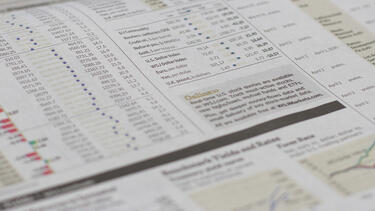Politics and Policy
The Problems with a Socialist Vision for NYC
Yale’s Jeffrey Sonnenfeld and co-authors suggest that some of New York City mayoral candidate Zohram Mamdani’s socialism-inspired proposals, such as city-owned grocery stores, are likely to run into inefficiencies and unanticipated downsides. They write that capitalism can be a better engine of progress.

Can the National Defense Be a Global Business?
Vivek Lall, the head of global strategy for General Atomics, says that the industry, responding to many of the same pressures as other businesses, is becoming increasingly globalized.

Putting the Iran Nuclear Deal in Context
Professor Paul Bracken, a leading security strategist and author of The Second Nuclear Age, discusses the Iran nuclear deal.

Will Openness and Transparency Strengthen Democracy in the EU?
HEC Paris's Alberto Alemanno on what the EU's commitment to openness means in practice.
Is Making All Banks Follow the Same Rules a Bad Idea?
Standardization. Harmonization. Coordination. They all sound like good ideas. But in a lecture at Yale SOM, Roberta Romano, the Sterling Professor of Law at Yale Law School, argued that the convergence of banking regulations brought about by the Basel Accords may have had the unintended effect of fueling the financial crisis.

Inspiring Economic Growth
Robert Shiller proposes government spending that inspires a vision of a better future.
More Public Toilets May Reduce Sexual Assault in South Africa
A new study by researchers at the Yale School of Management and the Yale School of Public Health.
Can We Have Economically Secure Retirements?
The end of defined-benefit pensions and a volatile stock market have made many Americans skeptical that they can retire comfortably. Is a new model emerging for how we plan for retirement? A panel of experts and practitioners talks about policies to help us bolster our retirement savings.

Are ‘Patent Thickets’ Smothering Innovation?
One analysis estimated that a smartphone is covered by 250,000 patents. As technology grows increasingly complex, companies must navigate a web of intellectual property protections. Are innovation and competition suffering from the race to create enormous patent portfolios? Professor Stefan Wagner of the European School of Management and Technology (ESMT), a member of the Global Network for Advanced Management, talked with Yale Insights about the consequences of “patent thickets.”

Community Motivation and Subsidies Increase Toilet Use in Developing World
A combination of community motivation and subsidies targeted to the poor is the most effective way to increase toilet ownership and use, and decrease open defecation, in developing countries, according to a new study published in the journal Science.
Can Cross-Sectoral Collaboration Reverse the Trend toward Income Inequality?
Income and wealth inequality in the U.S. has become a topic of widespread concern and discussion. A recent panel of Yale SOM alumnae posited that action from the federal government is unlikely. But the panelists found reason for hope in examples of the public, private, and nonprofit sectors collaborating to address the nation’s wealth gap.
